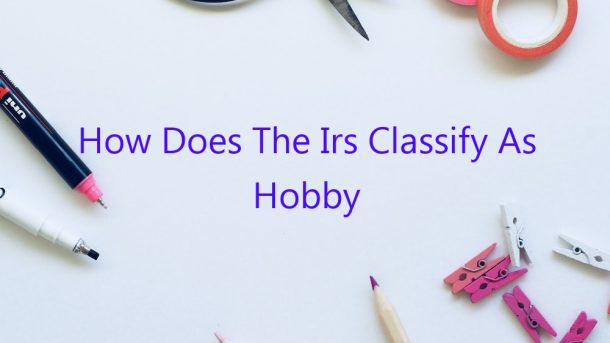The Internal Revenue Service (IRS) classifies a hobby as an activity done primarily for pleasure and not for profit. If you have a hobby, you can still deduct some of the costs associated with it on your taxes. However, the deductions you claim must be reasonable and you can only deduct expenses that are related to the hobby.
To determine if an activity is a hobby or a business, the IRS looks at a number of factors, including how much time and money you spend on the activity, whether you depend on the income from the activity to support yourself, and whether you have made a profit from the activity in the past. If the activity is a hobby, you can only deduct expenses that are above the amount of income you earned from the hobby.
If you are considering starting a hobby business, there are a few things you can do to make sure you are in compliance with the IRS. Make sure you keep good records of your income and expenses, and be prepared to show that the business is not just a hobby. You may also want to consult with a tax professional to make sure you are taking all the deductions you are entitled to.
Contents
What does the IRS identify as the difference between a business and a hobby?
The Internal Revenue Service (IRS) identifies several factors that distinguish a business from a hobby. Generally, taxpayers engage in a business to make a profit, while taxpayers engage in a hobby for recreation or pleasure. The IRS looks at several factors to make this determination, including whether the taxpayer carries on the activity in a business-like manner, whether the activity is profitable, and whether the activity is conducted for the primary purpose of making a profit.
The IRS defines a business-like manner as one in which the taxpayer engages in the activity with the intent to make a profit. This includes regularly and systematically making efforts to further the activity, such as advertising and recordkeeping. In contrast, a taxpayer who engages in a hobby for recreation or pleasure typically does not make these efforts.
The IRS also looks at whether the activity is profitable. A profitable activity is one in which the taxpayer has earned more income from the activity than he or she has expended. In contrast, a hobby is an activity in which the taxpayer has not made a profit. The primary purpose of a hobby is generally recreation or pleasure, while the primary purpose of a business is to make a profit.
The IRS will also consider other factors, such as the time and effort the taxpayer devotes to the activity, the taxpayer’s losses in the activity, and whether the activity is a regular part of the taxpayer’s business or personal activities.
If the IRS determines that an activity is a hobby, the taxpayer may not deduct any expenses related to the activity. However, if the taxpayer can demonstrate that the activity is a business, the taxpayer may be able to deduct expenses related to the activity.
Do I have to claim my hobby on my taxes?
There is no definitive answer to whether or not you have to claim your hobby on your taxes. The Internal Revenue Service (IRS) does not have a specific rule that addresses this issue. Instead, the determination of whether or not to claim your hobby on your taxes is based on a number of factors, including whether or not your hobby is considered to be a business.
Generally, if you are engaged in a hobby for profit, you are required to report the income from that hobby on your taxes. However, if you are not engaged in the hobby for profit, you are not required to report the income from that hobby. In order to make this determination, the IRS looks at a number of factors, including the following:
-The time and effort you put into the hobby
-The amount of money you have invested in the hobby
-Whether you expect to make a profit from the hobby
-The records you keep of your hobby income and expenses
If you are not sure whether or not you have to report the income from your hobby on your taxes, you can speak to an accountant or tax specialist for guidance.
What happens if IRS deems business as a hobby?
The Internal Revenue Service (IRS) designation of a business as a hobby can have serious consequences for the business owner. The most significant consequence is the fact that any business income is considered taxable income, even if the business is not profitable. In addition, the business owner may not be able to claim any business deductions.
There are a few factors that the IRS considers when making a determination of whether a business is a hobby. The most important factor is whether the business owner is engaged in the business activity with the intent to make a profit. Other factors considered include the time and effort the business owner puts into the activity, the amount of money the business has lost, and whether the business activity is similar to other businesses of the same type.
If the IRS determines that a business is a hobby, the business owner will be required to report all income from the business on his or her tax return. In addition, the business owner will not be able to claim any business expenses as deductions on his or her tax return.
The consequences of being designated as a hobby by the IRS can be significant. It is important for business owners to understand the factors that the IRS considers when making this determination in order to avoid any unpleasant surprises come tax time.
How do you declare a hobby income?
When it comes to declaring your income, it can be a little confusing to know exactly what to include. For example, if you have a hobby that you also earn income from, do you include that income on your tax return?
The answer to this question is unfortunately not a straightforward one, as it depends on a variety of factors. Generally speaking, if you are earning income from a hobby, you will need to declare that income on your tax return. However, there are some exceptions to this rule.
For example, if you are only earning a small amount of income from your hobby, you may not be required to declare it on your tax return. Additionally, if the hobby is related to your job, you may not need to include that income on your tax return.
However, if you are unsure whether or not you need to declare your hobby income, it is best to speak with an accountant or tax specialist. They will be able to help you navigate the complex world of tax returns and will be able to advise you on what needs to be included.
Ultimately, it is important to be aware of the tax implications of your hobby income, as it can have a significant impact on your tax bill. So, if you are earning income from a hobby, be sure to declare it on your tax return and avoid any penalties from the IRS.
At what point does a hobby become a business?
There’s a blurry line between a hobby and a business. At what point does a pastime become a profession?
For some, the answer is easy. If you’re making a profit, your hobby is a business. For others, the distinction may be less clear.
There are a few key factors to consider when determining whether your hobby has crossed over into the professional realm.
Are you making a profit?
This is the most obvious indicator that your hobby has become a business. If you’re earning money from your hobby, it’s no longer just a pastime – it’s a profession.
Are you dedicating enough time to it?
If you’re devoting most of your free time to your hobby, it’s likely no longer a hobby – it’s a job. If you’re not making a profit yet, but you’re spending a lot of time and effort on your venture, you may be heading down that path.
Are you turning a profit?
Even if you’re not dedicating all your time to your hobby, if you’re making a profit from it, it’s definitely a business. This can be a tricky line to walk, as you don’t want your hobby to consume your life. But if you’re able to make a little money from it on the side, that’s a good sign.
Are you providing a service or selling a product?
If you’re offering a service or selling a product, that’s a clear sign that your hobby has become a business. This is where the line between a hobby and a profession can become especially blurry.
Are you marketing your hobby?
If you’re promoting your hobby to others, that’s a sign that you may be turning it into a business. Even if you’re not making a profit yet, if you’re actively trying to grow your venture, it’s probably time to start thinking of it as a business.
So, at what point does a hobby become a business?
There’s no definitive answer, but if you’re answering yes to most of the questions above, it’s likely that your hobby has crossed over into the professional realm.
How do you determine if an activity is a hobby or business?
When it comes to hobbies and businesses, there is a fine line between the two. Determining if an activity is a hobby or a business can be difficult, but there are some things you can look at to help make the distinction.
The main difference between a hobby and a business is that a business is usually undertaken with the intention of making a profit. Whereas a hobby may or may not generate income, the main focus of a hobby is typically relaxation, enjoyment, or personal satisfaction.
There are a few key factors to consider when trying to determine if an activity is a hobby or a business. These include:
– The purpose of the activity: Is the main purpose of the activity to make a profit, or is it for personal enjoyment?
– The time commitment: How much time is being dedicated to the activity? Is it a part-time or full-time pursuit?
– The financial investment: How much money has been invested in the activity? Is it a money-losing or money-making proposition?
– The risk involved: Is there any risk involved in the activity? Is it a low-risk or high-risk venture?
– The level of organisation: Is the activity well-organised, or is it more casual?
Based on these factors, you can get a better idea of whether an activity is a hobby or a business. If the main purpose of the activity is to make a profit, and if a lot of time, money, and effort is being put into it, then it is likely a business. If the activity is more casual, and is undertaken for personal enjoyment, then it is likely a hobby.
What is the limit for hobby income?
There is no limit to the amount of money you can make from your hobbies, as long as the income is reported and taxes are paid on it. The only limit is the amount of time you want to devote to your hobbies. You can make as much money as you want from your hobbies, but you need to be careful not to let your hobby become a full-time job. If you do, you may need to start paying taxes on the income, and you may not be able to claim the income as a deduction on your taxes.




